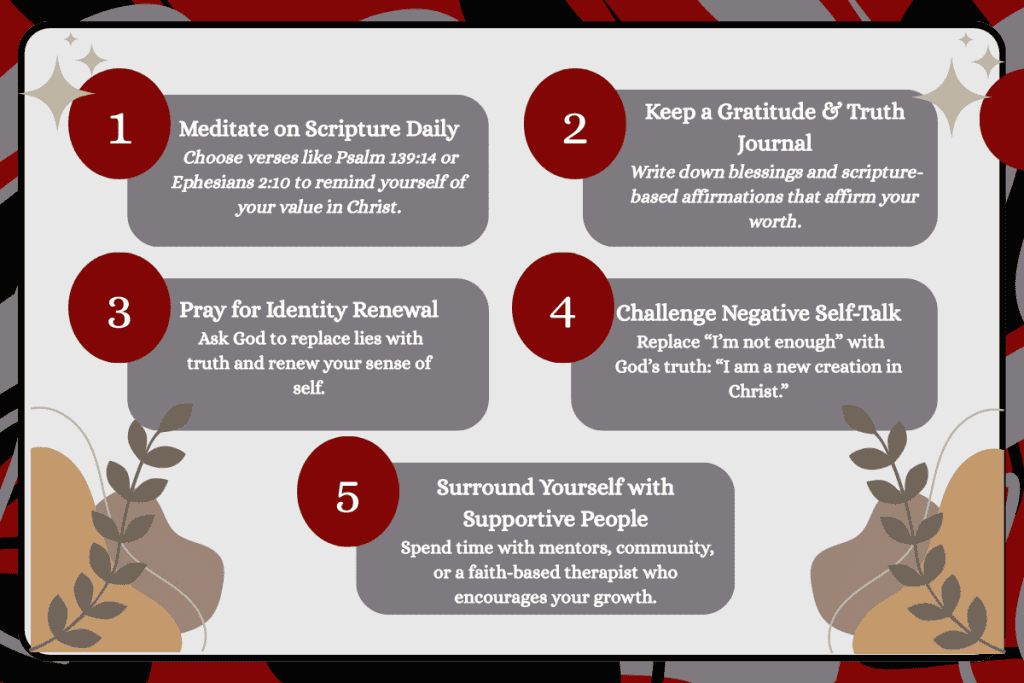Have you ever looked in the mirror and felt like you weren’t enough, not smart enough, not good enough, or worthy enough? Many believers silently carry this weight, even while faithfully serving God and showing up for others. These thoughts can sneak into our hearts, affecting how we see ourselves, how we treat others, and even how we believe God sees us.
Christian self-worth is about seeing yourself the way God does, loved, chosen, and valuable beyond measure. It’s not built on achievements, appearance, or the approval of others. Instead, it’s grounded in the unshakable truth of God’s Word. When we measure our worth through His eyes, the lie of “I’m not enough” begins to lose its power.
Faith can show us the truth about who we are, but therapy can help us understand why the lie took root in the first place. Together, faith and therapy can guide us toward freedom, healing both the heart and the mind. This journey is not about becoming “enough” someday. It’s about realizing you already are, in Christ, and learning how to live like you believe it.
What Is Christian Self-Worth?
Christian self-worth is the deep, steady assurance that your value comes from God, not from what you do, how you look, or what others think about you. It’s about embracing your identity as a beloved child of God, created on purpose and for a purpose. This kind of self-worth is unshakable because it’s rooted in His unchanging truth, not in the shifting opinions or standards of the world.
The Bible reminds us in Psalm 139:14 that we are “fearfully and wonderfully made,” and in Ephesians 2:10 that we are “God’s handiwork, created in Christ Jesus to do good works.” These verses aren’t just nice words; they are declarations of identity that stand firm no matter what life throws at us. When you live with Christian self-worth, you carry the peace of knowing that your worth is secure, even in moments of failure or uncertainty.
Unlike worldly self-worth, which often rises and falls with success, relationships, or appearance, Christian self-worth is constant. It doesn’t ignore your flaws or struggles, but it frames them in the light of God’s grace. You can acknowledge your weaknesses without letting them define you, because your ultimate identity rests in who God says you are, and He calls you loved, chosen, and enough.
The Lie of “I’m Not Enough” Where It Comes From
The belief that “I’m not enough” often starts quietly, weaving itself into our hearts long before we realize it’s there. For some, it begins in childhood, maybe through criticism, neglect, or unrealistic expectations from parents, teachers, or authority figures. Others may have absorbed it from a culture that measures worth by performance, appearance, or possessions. Over time, these experiences plant seeds of self-doubt that can grow into a deep-rooted belief that we are somehow lacking.
This lie can also form through painful life experiences like rejection, betrayal, or failure. The enemy uses these moments to whisper distorted messages about who we are, convincing us that our mistakes define us or that we will never measure up. Social media can make this even harder, as it invites constant comparison to curated, picture-perfect versions of other people’s lives. These comparisons quietly chip away at our confidence, leaving us feeling like we’ll never be “enough.”
For Christians, the most damaging part of this lie is how it distances us from God’s truth. When we believe we’re not enough, we often pull back from His presence, feeling unworthy of His love or grace. We may pray less, serve less, or doubt His promises. But the reality is, this lie doesn’t come from God; it comes from a world and a spiritual enemy that wants to keep us from living in the fullness of our God-given identity. Recognizing where this belief began is the first step toward breaking its hold.
The Spiritual Truth of Who God Says You Are
God’s Word makes it clear: your worth is not up for debate. You are a child of God (John 1:12), chosen and dearly loved (Colossians 3:12), and created with a specific purpose (Jeremiah 29:11). These truths are not dependent on your performance, perfection, or popularity. They are anchored in God’s character, which never changes. Even on days when you feel like you’ve failed, God’s love for you remains steady. He sees every part of you, the good, the hard, and the messy, and still calls you His own.
When the lie “I’m not enough” tries to take over, it’s an opportunity to speak God’s truth over your life. This isn’t about ignoring your struggles; it’s about seeing them through the lens of grace. You can acknowledge your imperfections while remembering that Christ’s sacrifice covered them all. In His eyes, you are already enough because you are His. Holding onto these promises allows you to replace shame with confidence, fear with peace, and self-doubt with hope.
How Faith and Therapy Work Together to Build Christian Self-Worth
Faith lays the foundation for your identity by grounding you in God’s truth, while therapy gives you tools to understand and heal the deeper wounds that keep you from living in that truth. Through faith, you learn who God says you are, loved, chosen, and valuable. Through therapy, you begin to uncover the root causes of your self-doubt, such as past traumas, unhealthy thought patterns, or harmful relationships. Together, these two approaches address both the spiritual and emotional layers of your self-worth, creating a more complete path to healing.
A faith-based therapist can help you challenge distorted thinking using both biblical truths and evidence-based techniques, such as reframing negative self-talk or practicing self-compassion. For example, cognitive restructuring can be paired with scripture to replace lies with God’s promises, while narrative therapy can help you rewrite your life story in light of His grace. By blending the strength of your faith with practical strategies, you can move from simply knowing your worth in Christ to living it out confidently in every area of your life.
Practical Steps to Strengthen Your Christian Self-Worth

1. Meditate on Scripture Daily:
Choose verses that affirm your value in Christ, such as Psalm 139:14 or Ephesians 2:10. Read them slowly, reflect on their meaning, and ask God to help these truths sink deeper into your heart.
2. Keep a Gratitude and Truth Journal:
Write down moments you see God’s hand in your life, along with affirmations drawn from scripture. This can help shift your focus from perceived shortcomings to the blessings and truths that remind you of your worth.
3. Pray for Identity Renewal:
Ask God to show you how He sees you. Pray specifically for Him to replace lies with truth and to give you the courage to live from a place of love, not fear.
4. Challenge Negative Self-Talk:
When you catch yourself thinking, “I’m not enough,” pause and ask, “Is this what God says about me? ”Replace the thought with a scripture-based truth that speaks life into your situation.
5. Surround Yourself with Supportive People:
Spend time with those who encourage your growth and affirm your identity in Christ. This could be a mentor, small group, or faith-based therapist who will walk with you in truth and grace.
Final Thoughts
The lie that says “I’m not enough” can feel loud and convincing, but it will never be stronger than God’s truth about you. From the moment He created you, He declared your worth. You are loved, chosen, and precious in His sight, not because of what you’ve done, but because of who He is and what He has spoken over your life. Your value doesn’t need to be earned; it is already secured in Christ.
If you are struggling to believe this today, take one small step. Open your Bible and read His promises. Write down the truths you want to hold onto. Or reach out to a faith-based therapist who can help you walk this journey of healing and renewal. You are not alone, and you are not broken beyond repair. God’s grace is more than enough, and so are you.
Blessings,




